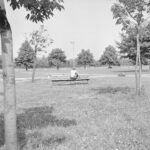Co-thinking: on art research
In Anglo-Saxon theory there are many different definitions and related terms (including arts-based research, practice-led research, performance as research, research in/for/through art). Generally speaking, artistic research is a diverse set of practices for creating and sharing knowledge that emerge at the boundaries of science, art and social activity. In the West, where they have gained recognition and financial support, their influence on the cognitive strategies dominant in cultural institutions can already be seen. Today, there is even talk of “artistic humanities” or the “post-research state of art”.
Meanwhile, in Poland, artistic research has not yet been recognised as a fully-fledged form of knowledge creation. Although artists have been using scientific research methods for years, and scientists have recently begun to draw inspiration from the field of art, there is still a lack of reflection on these transdisciplinary practices. Little has been written about their impact on our way of knowing and thinking about the world in relation to other people, animals, architecture or the ecosystem. Artistic research is a blind spot in Polish culture – an invisible area, yet full of potential – a source of alternative forms of knowledge creation that help to reformulate institutional hierarchies of cognitive practices.
In the cracks between cultural institutions
The lack of reflection on the identity and agency of artistic research stems from its institutional marginalisation. Theatres and galleries are reluctant to support the creators of these processual activities because the outcome of their work is not always a material work of art. In turn, the current system of funding science reinforces disciplinary divisions and discourages scientists from combining methods and knowledge from different fields. Conducting artistic research therefore means unpaid work in the cracks between cultural institutions. Under these conditions, it is impossible to develop a sustainable, in-depth, long-term artistic research practice.
The idea for the Co-thinking project arose from the need to change this precarious situation. As part of the project, we will invite people who work on the border between science and art, who are associated with diverse, often distant disciplines, institutions and backgrounds to cooperate. It is high time to get to know each other and talk about the dispersed, heterogeneous identity of Polish artistic research. Co-thinking is both a series of networking sessions and a collective process of artistic research, during which we will seek answers to the following questions:
- What is artistic research?
- What cognitive practices and ways of creating and sharing knowledge are generated in artistic research processes?
- Under what economic conditions and in what institutional and disciplinary environments do people who conduct such research work?
- How can create decent working conditions for artistic research be created Poland?
Gatherings
During the course of two meetings, we will use facilitation methods to give participants as much influence as possible over the course of the research. We want to experiment with new forms of knowledge creation, generously share our experiences, infect each other with ideas and carefully follow what the process brings – without assuming the creation of any material effect in advance. We see these meetings as a starting point for further cooperation in favour of artistic research in Poland. It is high time for these marginal practices to receive recognition and adequate financial support. Thus, we want practices of co-thinking to make possible what was previously unthinkable.
Curator: Anna Majewska
Curator: Anna Majewska
Producer: Alicja Berejowska
WOK carers: Anna Galas-Kosil, Marta Michalak, Agnieszka Tiutiunik
Facilitators: Paulina Brelińska-Garsztka, Alicja Czyczel, Zofia Małkowicz, Anna Majewska, Zofia Reznik
Merit cooperation: Paulina Brelińska-Garsztka, Alicja Czyczel, Jakub Depczyński, Piotr Morawski
Organisers:
- Warsaw Observatory of Culture
- Ministry of Science and Higher Education
- Faculty of Polish Studies and the Institute of Polish Culture at the University of Warsaw
- Faculty of Polish Studies at the Jagiellonian University
Partner:
- Museum of Modern Art in Warsaw
Co-thinking is a part of the project Artistic-research Practices of Knowledge Production carried out by Anna Majewska under the MNiSW “Pearls of Science” grant.
The project was co-financed by the Ministry of Science and Higher Education and the “Excellence Initiative” Programme at the University of Warsaw.





